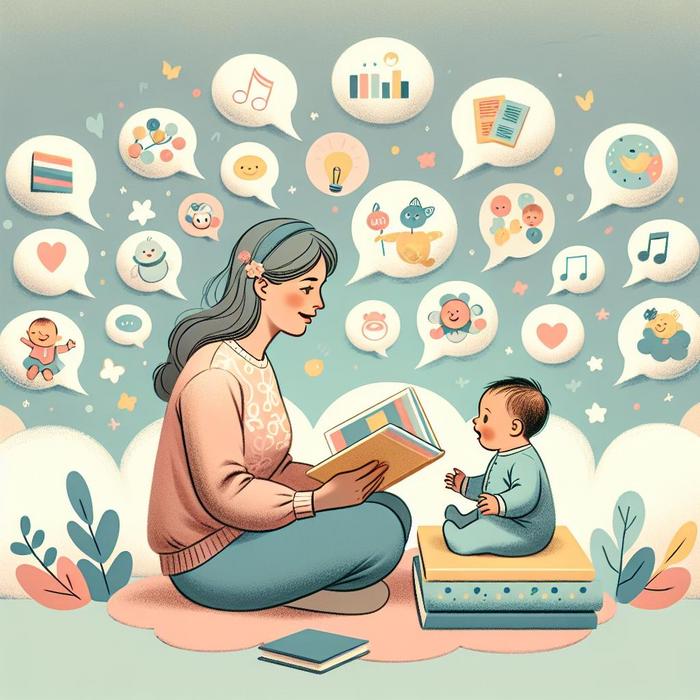The Joy and Challenge of Early Speech Development
While every parent eagerly waits for their baby’s first word, it’s crucial to understand the importance of early speech development in your child’s growth. From simple babbling to forming full sentences, each stage plays a significant role in your child’s communication skills. If you’re searching for practical yet fun communication activities, you’ve come to the right place! Let’s delve into the realm of baby language skills and explore various talking tips.
The Power of Music in Boosting Speech Development
Music is more than just an entertaining hobby; it’s a powerful tool that can enhance your child’s early speech development. When your baby listens to a melody or rhythm, their brain starts working on deciphering the sounds, which can lead to the development of language skills. Not convinced? Check out this article to understand the proven benefits of music in children’s early years.
Handling the Teething Issues
Teething is a crucial milestone in your child’s life, but it can also be a trying time for you and your baby. Teething might make your baby feel uncomfortable, and it might leave you wondering why your baby won’t stop crying. Here’s a detailed guide that might help you troubleshoot common teething issues and ensure your baby’s comfort.
Bonding Through Books and Creating a Storytime Ritual
Remember your childhood bedtime stories? Those magical tales not only transported you to whimsical worlds but also aided your language and communication skills. Creating a storytime ritual can have a similar impact on your child. Bonding through books allows your child to associate positive emotions with language, encouraging them to express themselves more freely. If you need pointers on creating a storytime ritual, this article offers some excellent advice!
Fun and Interactive Speech Therapy for Your Little One
- Play-dough: Yes, the childhood favorite can help improve your child’s language skills. Here’s a fun activity from TLC Speech Therapy that’s sure to caught your child’s attention and foster their language growth.
- Use of Gestures and Sign Language: Cues like pointing or using sign language before they can talk proficiently can expedite your child’s speech development. Check out this YouTube channel for some helpful videos.
- Interactive Games: Conversational games and interactive activities are great ways to encourage your child’s language development. Here’s a YouTube playlist of games for you to try.
Developing Public Speaking Skills From Early Age
While it may seem too early to think about developing public speaking skills in your little ones, it’s never too soon to start. Harvard Professional Development offers 10 tips for improving public speaking that you can adapt and introduce to your young ones.
Language-Learning Through Play
Play is one of the most effective ways to encourage language development in children. It is during playtime that children get the opportunity to explore, experiment and communicate with others. This interaction aids in developing their communication skills. For instance, playing with dolls can foster a pretend conversation, helping them create simple sentences and initiating dialogues.
In addition, creative games like “Simon says” or “Follow the Leader” can help enhance your child’s understanding and response to commands, thereby improving their listening skills. For more on fun activities that develop language learning, visit British Council’s children resources.
Engaging in Everyday Activities
Everyday activities present several opportunities to foster language skills development. Talking to your child throughout the day about what you’re doing, what they’re doing, and what’s around them will expose them to a variety of vocabulary.
For instance, during mealtime, you can describe the flavors of various foods and stimulate your child’s senses. During bath time, provide commentary on the process; this not only verbalises the routine for your child, but also increases their exposure to language. For more ideas, explore these activities recommended by ASHA to bolster language usage in day-to-day tasks.
Picture Books: An Early Tool For Language Skills
The use of picture books for early language skill development is a proven method. These books stimulate your child’s imagination and help them associate words with pictures, thereby comprehending language better. In addition, it can significantly broaden their vocabulary and sentence construction abilities. You can find tips on how to use picture books for instilling early language skills at Kids Chatter.
Paving the Path to Speech Therapy
Despite all efforts, sometimes children require professional intervention to address language delays. Early identification can offer your child the best chance to improve their communication skills and succeed socially and acadically. So, if you do notice your child struggling with their speech or language development, don’t hesitate to seek professional help. Discover more about this at Speech Time Fun’s resources.
Remember, every child is unique and develops at their own pace. The secret is to keep communication consistent, engaging, and fun without placing immense pressure on your little one. Make learning an enjoyable journey, not a race, and allow your child to explore the wonders of language at their own pace. Happy talking!






